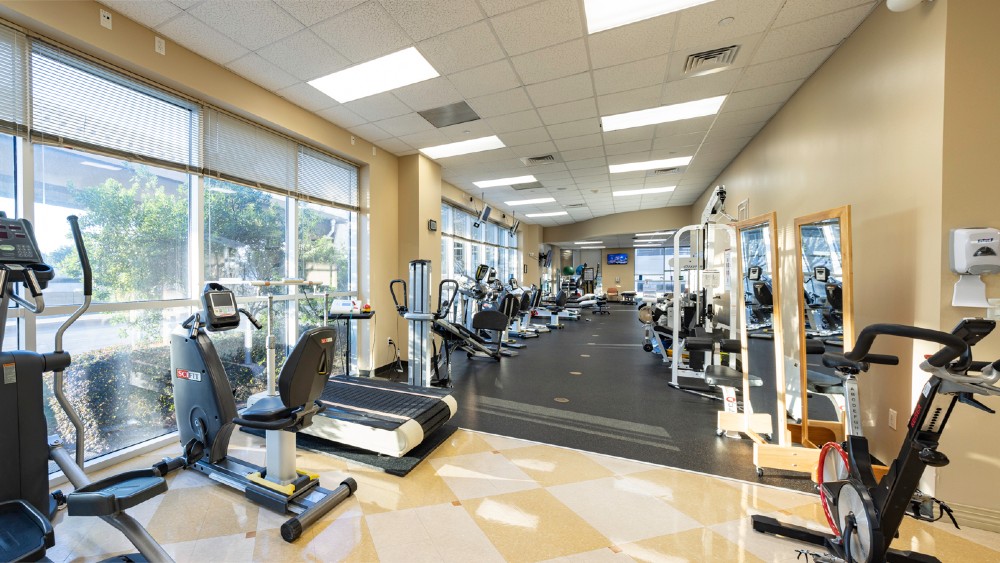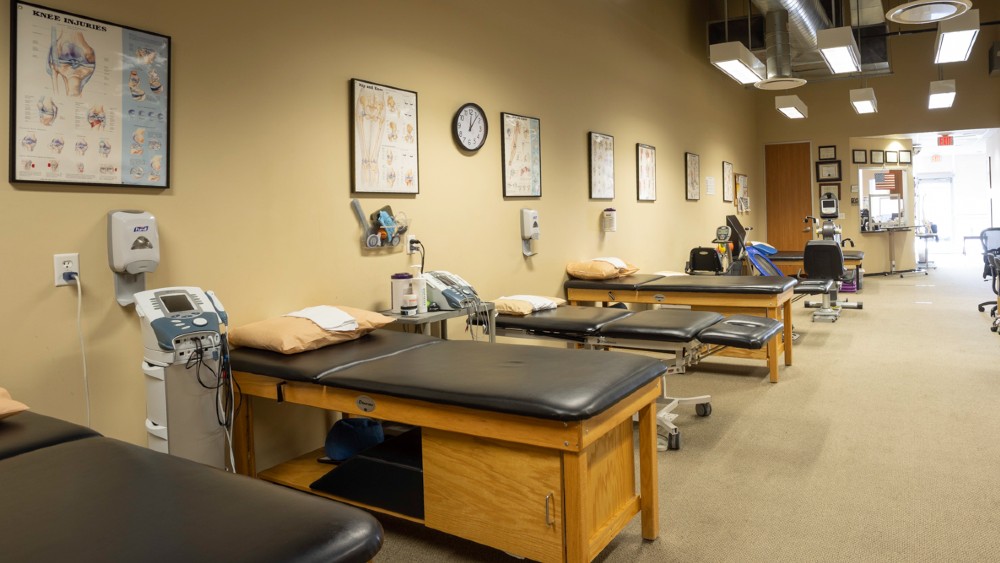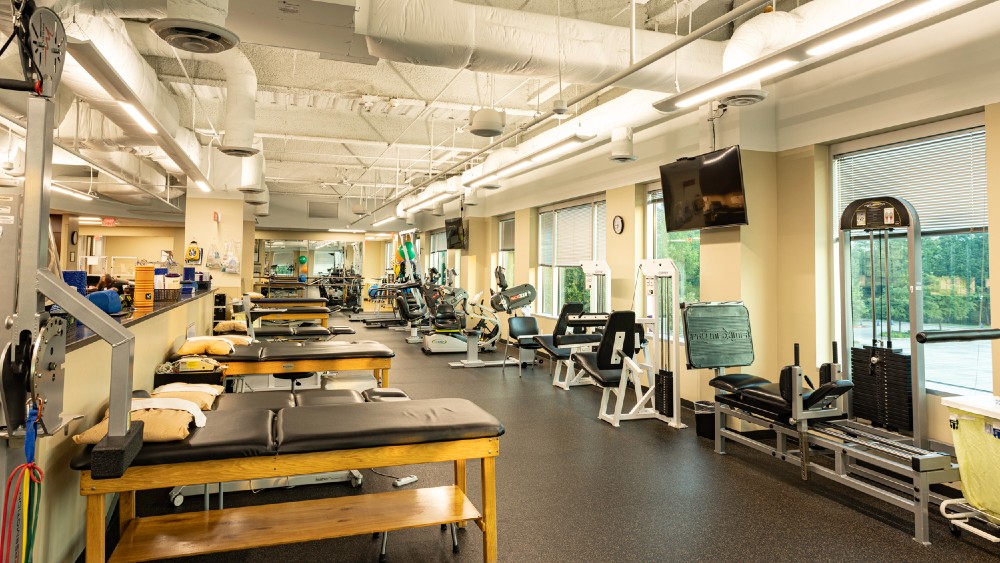TMJ Physical Therapy at Memorial Hermann

What is TMJ disorder?
TMJ disorder occurs when the temporomandibular joint comes out of alignment. One of the significant symptoms you may notice is pronounced jaw pain. In addition, TMJ disorder could lead to headaches, muscle spasms, neck pain, jaw pain and even toothaches. While there are some disease-related causes of TMJ disorder, such as arthritis or infections, they are usually rare. Most cases of TMJ disorder are caused by stress.
What are some other TMJ disorder symptoms?
In addition to the painful sensations that come with TMJ disorder, you may notice other symptoms. You may hear or feel popping or clicking when you talk or eat. Your jaw may lock open at times. In addition, as you open or close your mouth, the lower jaw (mandible) may not drop directly— instead, it shifts from side to side. This imbalance in the way the muscles pull is a likely cause of your neck or head pain.
What are risk factors or causes for TMJ disorder?
The greatest cause and risk factor for TMJ disorder is stress, both physical and mental. Patients who have posture issues commonly have TMJ disorders. You are likely at risk for TMJ pain if you grind your teeth at night, frequently chew on gum or ice as a nervous habit or struggle with anxiety that causes you to clench your teeth. If you find yourself in deep concentration that causes you to sit in a tight posture, you may have issues with TMJ. This repeated stress on the joint throughout time can create problems. TMJ disorders are usually seen in middle-aged women who carry tension in their jaw or others who struggle with vestibular issues or vertigo.
Outside of stress, TMJ disorder can affect patients who have had strokes or Bell’s palsy, mobility issues or dental appliances such as braces, retainers or cheap mouth guards that do not fit inside the mouth properly. In many cases, the tension of your teeth moving inside your mouth can create problems. Trying to eat a lot of crunchy foods or opening your jaw too widely for big bites can also aggravate symptoms.
How is TMJ disorder diagnosed?
A physical therapist will look at several factors, including neck mobility below the jaw, muscle tension in your head, jaw and face, and even your cervical vertebrae. In some cases, they may even do a gloved finger exam to palpate (massage) the soft tissues at the back of the jaw. What they are looking for in this case is pronounced tenderness on one side or the other.
In addition, they will test the strength of your muscles by applying pressure on the jaw in both open and closed positions. Other signs of TMJ disorders include changes in the shape of your face as you open and close your mouth, swelling on one side or the other, and previous injuries, dental work, surgeries or a history of headaches.
How is TMJ disorder treated?
In addition to using physical therapy to increase mobility in all the neck spaces, a key part of TMJ disorder rehab is being mindful of stress and how you handle it. Think about issues that may cause you to clench your jaw frequently or create tightness in your posture. Muscle relaxers and anti-inflammatories (including topical creams) can help reduce tightness and inflammation in these affected muscle tissues.
Physical therapy involves using manual treatment to move the affected joints and relax your muscles—or, in some cases, to strengthen weaker ones. Sometimes therapy focuses on strengthening exercises for your jaw and facial muscles. Electrical stimulation can also help to relax muscles. Dry needling (similar to acupuncture) has been effective in treating some cases. Finally, a dentist or oral/facial/maxillary specialist may look at a procedure called splinting. Splinting is outside of the normal scope of our treatment at Memorial Hermann, and involves molding a device that resembles a mouth guard which helps to prop open your bite slightly.
Benefits of TMJ Therapy
- Education in proper TMJ positioning and function
- Retraining oro-facial muscles for proper kinematics
- Instruction in correct posture, including sleeping posture
- Joint protection activities
- Muscle spasm and trigger-point release techniques
- Instruction in self trigger-point therapy
- Use of home heat, cold and TENS modalities for pain control
- Instruction in activities and exercises to help manage the condition independently at home
- Integrating therapy into a whole-body fitness program
What results can you expect from treatment?
Throughout the long term, TMJ treatment creates better awareness of your posture and response to stress. The most effective treatments occur once you realize how your unconscious behaviors might be impacting your muscles. As with all exercise, adding more repetitions or doing things in between visits can quicken your recovery.
Because not all patients are the same, the results of treatment for TMJ disorders can vary. In some cases, therapy works as a mode of pain management to help lessen symptoms; in others, some people can completely alleviate the symptoms. The best outcomes occur when you take a proactive approach to exercising your muscles and joints to determine the exercises that work best to alleviate your symptoms.
How do I get started with treatment?
Note: Patients seeking physical therapy from TMJ will need a referral from a physician. Your physician can refer you after a simple evaluation.
The sooner you address the issue and take care of your physical health, the sooner you are on the road to recovery. As with any type of exercise-related activity, dress for comfort. Clinics are typically cool due to the physical exercise being performed inside.
Why choose Memorial Hermann for TMJ disorder treatment?
In addition to providing compassionate care, Memorial Hermann offers convenient physical therapy locations throughout the Greater Houston. We encourage our practitioners to stay up-to-date on current trends and emerging therapies, allowing them to deliver cutting-edge treatments to improve our patients’ lives.
Medication and surgery are not the only options for relief of TMJ disorder symptoms. Schedule your initial evaluation for physical or occupational therapy online.
Ready for Relief?
If you’re interested in finding relief through physical or occupational therapy, the therapists at Memorial Hermann Sports Medicine & Rehabilitation are here to help. Request an initial evaluation appointment by filling out the form below or calling (713) 521-0020 or (888) 301-8477.




